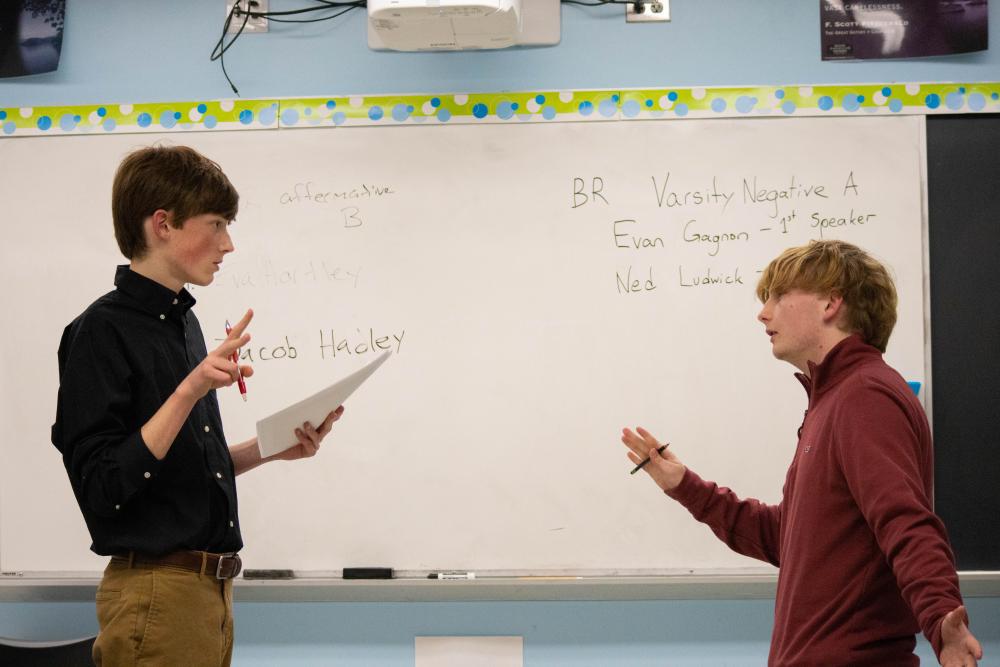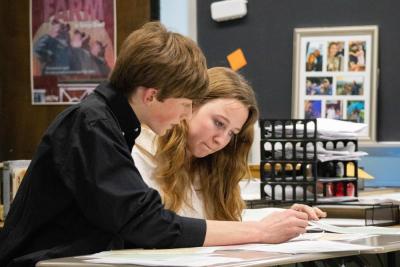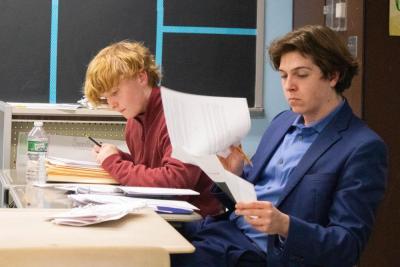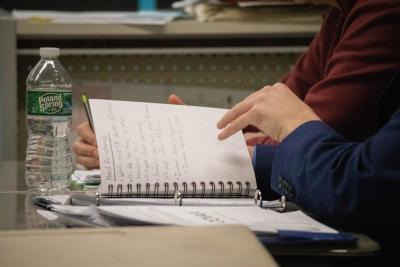Old Rochester students display quick wits at debate tournament
NEW BEDFORD — There was a battle raging in classroom 4-110 at New Bedford High School.
The combatants were Old Rochester Regional High School juniors Eva Hartley and Jacob Hadley. They faced off against two students from Bridgewater-Raynham High School in a war of wits during a debate tournament on Wednesday, Feb. 15.
Hartley and Hadley argued the “affirmative,” in favor of one specific topic called the “resolved.”
The resolved is a complex topic that, according to the rules of debate, no judge or spectator is expected to completely understand.
“For a lot of this they’re going to be talking above your head,” explained a debate coach before the tournament started. “That’s ok because they’re not talking to you, they’re talking to each other.”
This year’s resolved was: The United States federal government should substantially increase its security cooperation with the North Atlantic Treaty Organization in one or more of the following areas: artificial intelligence, biotechnology, or cybersecurity.
Hartley and Hadley chose the “biotechnology” option and had months to create an “air-tight” plan for how the United States could work with NATO to develop a program to create vaccines for all known diseases, explained Hartley.
Kibi Williams, a New Bedford High School English teacher, served as a neutral judge. Williams was tasked with determining if the affirmatives’ plan met four “stock issues”:
Topicality, if the affirmatives’ plan is directly related to the resolved; need for change, if the affirmatives’ prove that there is a problem that should be fixed; solvency, if the affirmatives’ plan will actually solve the problem; and inherent barrier, if there is one — and only one — reason why the affirmatives' plan isn’t possible.
The students from Bridgewater-Raynham, who argued the “negative,” only had to poke a hole in one of the affirmatives’ stock issues to win.
Hartley spoke first, she presented her side’s argument in an eight-minute speech. During that time the students from Bridgewater-Raynham scribbled notes and conferred quietly on how to break down her points.
Then, during the first rebuttal, Evan Gagnon from Bridgewater-Raynham did his best to rip apart Hartley’s argument. He argued that her definition of “security cooperation” was faulty and that her plan was unworkable.
This was all par for the course, Hartley later said following the debate.
According to Hadley, different students are better suited to different parts of debate.
“Affirmative is definitely more for people who like their debates to be more predictable and aren’t as spontaneous ,” he said. “Negatives, they walk into a debate having no idea what the plan is and have to come up with an argument on the spot.”
Old Rochester Regional High School Debate Coach Colin Everett explained there are “different personality types” and that a student who liked to be prepared might gravitate towards the affirmatives and students who like to think on their feet might go toward the negatives.
Later on in the debate, Hadley had three minutes to cross examine the negative team.
“So your definition doesn’t relate to those two programs at all,” asked Hadley, cutting off Bridgewater-Raynham debater Ned Ludwick.
“Let me finish,” said Ludwick, claiming time to finish his answer.
“You should’ve been meaner,” whispered Hartley when Hadley sat back down.
During the cross examination portion of a debate, it’s important to use as much of your time as possible, explained Hartley.
When Ludwick interjected, it took precious time away from Hadley’s cross examination.
“When your opponent is saying ‘wait let me finish this,’ you have the right to say ‘no this is my time, let’s move on,’” said Hartley. “When it’s their [cross examination] you want to waste their time because you don’t want to let them ask their questions.”
Immediately following the debate Hartley and Hadley said that the negative team brought a lot of “new arguments” that they weren’t expecting to hear.
“I ran out of time but I think we should’ve challenged their definition,” said Hartley.
Hartley and Hadley won this debate — and then went on to win another during the tournament, bringing their season score to six wins and three losses.
Williams left the team notes on their debate in her judge’s rubric.
She wrote that Hadley “spoke with clarity and authority,” and that Hartley did a great job “utilizing evidence to substantiate [her] claims.”














